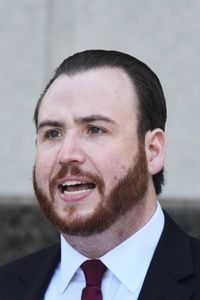Kevin Morenski
Elections and appointments
Education
Personal
Contact
Kevin Morenski (Republican Party) ran for election to the Florida House of Representatives to represent District 47. He lost in the Republican primary on August 18, 2020.
Morenski completed Ballotpedia's Candidate Connection survey in 2020. Click here to read the survey answers.
Biography
Kevin Morensky was born in Livingston Township in Essex County, New Jersey. He earned a bachelor's degree from Rensselaer Polytechnic Institute in 2009. He earned a J.D. from Florida State University College of Law in 2012. He earned a master's degree from Columbia University in 2015. Morenski's career experience includes working as a criminal defense attorney. He has been affiliated with the Florida Justice Association, the Free Software Foundation, the Electronic Frontier Foundation, and the National Rifle Association.[1]
Elections
2020
See also: Florida House of Representatives elections, 2020
General election
Democratic primary election
The Democratic primary election was canceled. Incumbent Anna Eskamani advanced from the Democratic primary for Florida House of Representatives District 47.
Republican primary election
2020
Ballotpedia survey responses
See also: Ballotpedia's Candidate Connection
Kevin Morenski completed Ballotpedia's Candidate Connection survey in 2020. The survey questions appear in bold and are followed by Morenski's responses.
Expand all | Collapse all
Originally from New Jersey, my journey through life first took me to Troy, New York, where I earned degrees in both Electrical Engineering and Biomedical Engineering while working part-time as a paramedic. From there, I moved to Tallahassee, Florida to attend law school at FSU. After earning a J.D., I moved to New York City to pursue a Ph.D. in computer science at Columbia University. However, my time in law school convinced me that Florida was my true home. I have been living in Orlando since 2015 and work full-time as a criminal defense attorney. I am a true conservative who believes in an enduring moral order, freedom and liberty of thought, and the principle of prudence. To quote Bennett B. Patterson in The Forgotten Ninth Amendment, "the survival of democracy depends not so much upon the agencies of government, but upon the restraints and self-discipline which we as individuals are willing to impose upon ourselves."
- We must reduce the size of government by strictly adhering to the principle of prudence through measured budget cuts. Our Bill of Rights is not a gift without obligation, and our republican form of government is neither self-executing nor self-perpetuating.
- We must completely revamp how we pursue criminal justice by focusing on incarcerating violent criminals, sex offenders, and major drug traffickers. At the same time, we must stop convicting and incarcerating people for non-serious criminal offenses. Addiction should be treated as a disease, not a crime.
- Freedom of speech and liberty of thought must be protected at all costs by maintaining the highest degree of patriotism. The survival of our democracy depends on it.
(1) Combating homelessness by focusing on mental health and addiction, rather than simply arresting and prosecuting homeless individuals. My experience as a paramedic has allowed me to witness this crisis up close and in depth.
(2) Ending the prohibition on cannabis by legalizing and taxing it. Individual freedom, personal responsibility, and the potential for small businesses to thrive are core tenets of conservatism. Legalization would be a boon to Florida's economy, which has been devastated by COVID-19. Our tourism industry, agriculture industry, and small businesses would all benefit from legalization, and the State could use the tax revenue to fund mental health and addiction treatment programs.
(3) Staunchly defending the Second Amendment. Disarming the people is the most effective way to enslave them. A well-armed, well-trained militia composed of the whole body of the people is the best and most natural defense of a free country. The proper corollary of a bill of rights is a bill of obligations, and our first obligation is to defend our country with our lives if necessary. I look up to my parents, first and foremost. They helped shape my morals and provided the resources necessary to excel in my interdisciplinary pursuits. My father's drive, grit, and fortitude have always inspired me to keep pushing further and to never give up. My mother's compassion and patience helped to foster and deepen my own empathy, which continues to evolve.
The most important characteristic of an elected official is a broad, interdisciplinary background that includes a solid understanding of the core principles of our government and the history of our nation. The ultimate ideal of government is to strike that balance which will encourage and protect the freedom of our individual natures, while simultaneously restrain the unfair and unjust purposes to which our human side is subjected.
More generally, a thorough understanding of the legislative process and the laws of the State of Florida is essential to being an effective Representative. At the same time, a Representative must be connected to the community he or she serves and must understand and respect their constituents' varied backgrounds, desires, needs, and life experiences.
Most important of all, however, is that an elected official must not be pursuing public office for selfish or self-serving reasons. The worst elected officials are the ones who view it as their career, rather than their duty. I am able to: (i) operate under immense pressure; (ii) think critically, analytically, and logically; and (iii) persuasively advocate for the interests of those I represent. I am the only candidate in my particular race with a legal background, and I am one of the few candidates for office whose full-time job is as a criminal defense attorney in private practice. My interdisciplinary background in emergency medicine, engineering, and law enable me to see the world through a lens that brings into focus insights that may otherwise go unnoticed or ignored. My commitment to public service was demonstrated early on in my life, and my full-time career requires an unwavering commitment to ethics and zealous advocacy. Altogether, I believe these qualities would make me a successful officeholder, which I define as an elected official who believes they have an ethical obligation to advocate for the interests and well-being of their constituents.
The collapse of the Soviet Union in 1991. I was six years old.
My first job was as an EMT in Troy, New York in 2005. I worked part-time while attending engineering school full-time. My experiences as an EMT ultimately impelled me to enroll in and complete a two-year evening paramedic program at a local community college. Life as an EMT and paramedic created a stark contrast to the rather idyllic and parochial environment of a northeastern, private engineering school. Witnessing first-hand how the bitterness of poverty and misfortune intensify the stress of emergency situations helped me to recognize and embrace my commitment to public service. Even in law school at Florida State, my passion for emergency medicine thrived: I passed Florida's paramedic exam and maintained my certification until roughly 2013.
"Non-Stop" or "Satisfied" (both from Hamilton: An American Musical).
I am a big fan of musical theater and orchestral music (film scores, specifically), which likely stems from my own musical upbringing (I've played alto and tenor saxophone since 4th grade).
The most important distinction between the Florida Senate and the Florida House of Representatives is that the Florida Senate has fewer members (40) but longer term lengths (4 years), whereas the Florida House has 120 members each serving two-year terms. This means that Representatives represent a smaller, more local constituency and should therefore be more accessible to the constituents. Additionally, the Florida House has the exclusive power to impeach officials who are then tried by the Florida Senate, which has the exclusive power to try officials impeached by the Florida House.
No. State legislators should come from all walks of life and backgrounds, like the constituents they serve. However, state legislators should have a thorough understanding of the history of the country and their state. However, a legal background is beneficial given the nature of the position: Interpreting legislation is challenging, and legislators must be able to understand the effects and consequences of the language used in their legislation.
Over the next decade, Florida's greatest challenge will almost certainly be managing population growth. Unbridled population growth will threaten conservation efforts in the state through the introduction of invasive species, increase demand on the Floridian Aquifer (which supplies most of our drinking water), overwhelm our transportation system, among other things. The end result is a degradation in the quality of life for Floridians.
The ideal relationship between the governor and state legislature is one based on trust: Trust by the governor in the legislative process and trust by the legislators in the governor's restrained use of the veto power and emergency powers. The degree of trust between the legislative and executive branches directly impacts their working relationship.
Only to the extent necessary to represent and advocate for the interests of your constituents. It goes without saying that all legislators should have respect for each other and live by the Golden Rule. Additionally, legislators owe the duty of maintaining the American tradition of integrity and must stamp out and refrain from the practice of unfair or unethical practices of collusion and deal-making.
Advances in statistics and machine learning can be used to remove political bias from the redistricting process. Giving a computer algorithm a state map and set of objectively fair rules based on traditional district-drawing criteria (such as compactness and contiguity) means that a computer could draw districts by itself, and the legislature could pick from among a set of reasonable options and rein in gerrymandering.
Judiciary Committee (Criminal Justice Subcommittee), Education Committee (Government Operations & Technology Appropriations Subcommittee)
Note: Ballotpedia reserves the right to edit Candidate Connection survey responses. Any edits made by Ballotpedia will be clearly marked with [brackets] for the public. If the candidate disagrees with an edit, he or she may request the full removal of the survey response from Ballotpedia.org. Ballotpedia does not edit or correct typographical errors unless the candidate's campaign requests it.
See also
External links
- ↑ Information submitted to Ballotpedia through the Candidate Connection survey on August 7, 2020
Leadership
Speaker of the House:Daniel Perez
Majority Leader:Tyler Sirois
Minority Leader:Fentrice Driskell
Representatives
Republican Party (84)
Democratic Party (33)
Vacancies (3)


 = candidate completed the Ballotpedia Candidate Connection survey.
= candidate completed the Ballotpedia Candidate Connection survey.


 = candidate completed the Ballotpedia Candidate Connection survey.
= candidate completed the Ballotpedia Candidate Connection survey.








